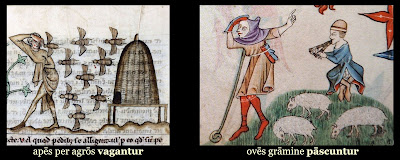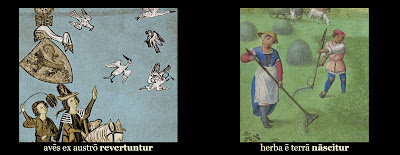https://www.youtube.com/watch?v=jNwBExn1zgg
This song is packed with aspects of Latin that have been
covered in the posts since the group started. If you’ve been following the
posts, or the other site, or you’re using your own resources, songs like this
really help you to see where you are, and / or point to areas that still need
to be looked at.
1st declension nouns
angaria, -ae [1/f]: (original meaning) compulsory service to
a lord (very apt in this song)
c(h)orda, -ae [1/f]: string (of a musical instrument)
fortūna, -ae [1/f]: fortune; fate
hōra, -ae [1/f]: hour
lūna, -ae [1/f]: moon
mora, -ae [1/f]: delay
rota, -ae [1/f]: wheel
hāc in hōrā: (ablative) in this
hour
sine morā: (ablative) without delay
Note: in Mediaeval Latin spelling there is shift from /ae/
to /e/to reflect pronunciation change e.g. saepe (often) > sepe; puellae >
puelle, there’s an interesting example in this song:
Corde pulsum tangite. This is from chorda, -ae
[1/f]: string of a musical instrument.
Chordae pulsum tangite │ literally: touch the
beat of the string; pluck the vibrating string
The other Mediaeval spelling to note is michi;
Classical Latin: mihi
2nd declension nouns
dorsum, -ī [2/n]: back
lūdus, -ī [2/m]: game
pulsus, -ī [2/m]: beat; pulse; strike
per ludum: (accusative) through(out)
/ during the game
3rd declension nouns
mēns, mentis [3/f]: mind
sors, sortis [3/f]: fate
egestās, egestātis [3/f]: poverty; want; need
potestās, potestātis[3/f]: power
virtūs, virtūtis [3/f]: virtue
salūs, salūtis [3/f]: safety; security; health
scelus, sceleris [3/n]: evil deed; wickedness
4th and 5th declension nouns
status, -ūs [4/m]: state; condition
aciēs, aciēī [5/f]: sharpness; keeness
glaciēs, glaciēī [5/f]: ice
statū (ablative) variābilis: changeable in state
/ condition
1st / 2nd declension adjectives
contrārius, -a, -um: contrary; conflicting
malus, -a, -um: bad; evil
nūdus, -a, -um: bare
vānus, -a, -um: vain; empty; deceptive
Note: these words below are not actually adjectives although
they have exactly the same endings
affectus, -a, -um: (here) weakened; impaired
dēfectus, -a, -um: tired; worn out
obumbrātus, -a, -um: darkened; shadowed
vēlātus, -a, -um: wrapped; veiled
In English, if we say, for example, the letter was written,
these words, known in grammar as passive participles, have the same meaning;
they will be discussed in a later post.
3rd declension adjectives
dētestābilis, -e: abominable; detestable
dissolūbilis, -e: dissoluble
fortis, -e: strong; brave
immānis, -e: immense; enormous; (here) inhuman
inānis, -e: empty; meaningless
variābilis, -e: variable; changeable
volūbilis, -e: turning; spinning
1st conjugation verbs
cūrō, cūrāre [1]: take care of; heal; cure
obdūrō, obdūrāre [1]: harden; persist
3rd conjugation verbs
crēscō, crēscere [3]: grow
dēcrēscō, dēcrēscere [3]: decrease
dissolvō, dissolvere [3]: dissolve
plangō, plangere [3]: lament
sternō, sternere [3]: knock to the ground; strike down
tangō, tangere [3]: touch; strike
Irregular
ferō, ferre: bring
The only verb that I’m not going to say anything about is:
michi quoque niteris │you bear upon me too
That involves an aspect of Latin verbs that will take quite
some time to explain. It’s best just to note it.
And take a close look at the image because there are three
verb tenses around the image of the king:
rēgnō, rēgnāre, rēgnāvī [1]: rule; reign
rēgnō: I rule / I am ruling
rēgnābō: I shall rule
rēgnāvī: I (have) ruled
















